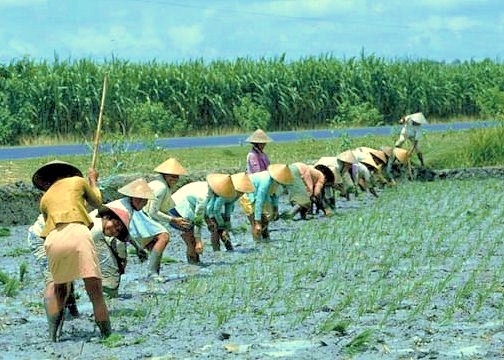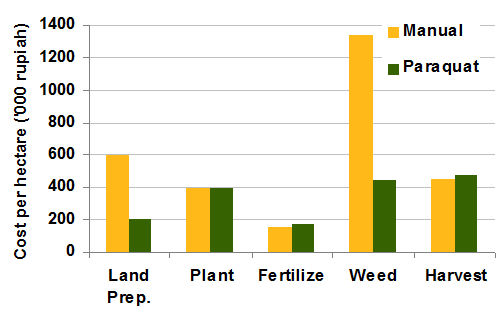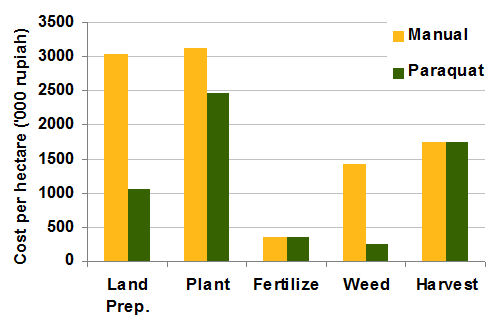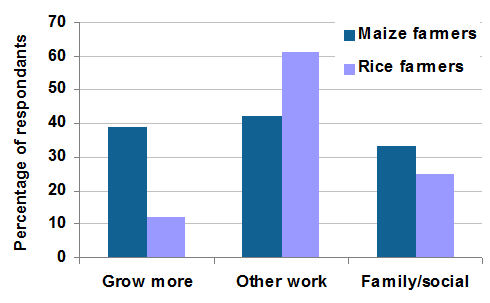 Rice planting in weed-free paddy
Indonesian farmers rely on paraquat to increase efficiency and productivity, generating more income and more time for their families. This has been confirmed by recent surveys carried out in two important agricultural districts of Indonesia.
Rice planting in weed-free paddy
Indonesian farmers rely on paraquat to increase efficiency and productivity, generating more income and more time for their families. This has been confirmed by recent surveys carried out in two important agricultural districts of Indonesia.
Maize and paddy rice are the major crops grown in Grobogan District, central Java. Since 1999, farmers in Grobogan have been expanding their maize growing. This was initiated by a change in government policy to encourage agroforestry.
Maize can be grown in young teak plantations while the canopy is still sparse. However, the additional cultivated land has put huge pressure on labor requirements.
Barito Kuala is a low lying rice growing district in the south of Kalimantan. For the most part the land is at, or only a few metres above, sea level, and much of it is subject to frequent flooding when the incoming tide pushes water back up the river deltas (see article on tidal rice). Rice is key to Indonesia’s food security. Although Indonesia is the world’s third largest producer of rice, it is also the seventh largest importer, with a current annual deficit of more than one million tonnes.1 Most farmers have been using paraquat since the 1990s.
Why use paraquat?
The surveys showed that in both districts paraquat is extensively used for weed control. In Grobogan District, 80% of farmers use paraquat to clear the land before planting corn and nearly 90% use it for inter-row weed control. Previously, farmers had to remove weeds by hoeing and manual pulling. In Barito Kuala, although paraquat cannot be used after the rice has been planted, all the farmers surveyed used it when preparing the land.
When asked why they use paraquat, by far the most common responses (70-85%) were because it saves costs and the need to hire so much labor. Spraying paraquat enables very large savings in the costs involved in preparing land for planting and in subsequent weed control operations (Fig. 1).
 1b. Maize growing costs
1b. Maize growing costs
 1a. Rice growing costs
1a. Rice growing costs
Figure 1: Comparison of costs of operations in crop production using manual weeding or spraying paraquat in rice (left) and maize (right).
Benefits to income and lifestyle
 Figure 2: Activities pursued by farmers in time freed-up by using paraquat.
Farmers were also asked how they used the extra free time generated as a result of the efficiencies gained (Fig. 2). Nearly 40% of maize farmers were growing more maize. The corresponding figure was less for rice farmers who tended to find other income generating activities.
Figure 2: Activities pursued by farmers in time freed-up by using paraquat.
Farmers were also asked how they used the extra free time generated as a result of the efficiencies gained (Fig. 2). Nearly 40% of maize farmers were growing more maize. The corresponding figure was less for rice farmers who tended to find other income generating activities.
In Barito Kuala district, oranges have become an important high value crop now that rice can be grown more efficiently. Significant numbers from both districts found that they now have more time to spend supporting their families and getting involved in their communities.
Since starting to use paraquat, many farmers explained that they have used the extra income to provide a permanent house for their family, to buy items such as motorcycles and to send their children to college.
References
1. USDA Foreign Agricultural Service report on Rice production in Indonesia (2012)

